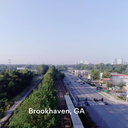Cities are fighting over 5G with telecom carriers and federal regulators

Published Date: 1/29/2020
Source: axios.com
The fate of the national race to build 5G wireless service depends on how effectively the guts of the network — namely, hundreds of thousands of bulky antennas — are placed in cities.Why it matters: While global tensions mount over pressure to build 5G networks as fast as possible, U.S. cities are in a fight of their own with telecom carriers and federal regulators over how new 5G antennas — or small cells — will be scattered throughout downtowns and neighborhoods.Driving the news: Next month, the Ninth Circuit Court of Appeals in Pasadena, Calif., will hear the case between cities and the Federal Communications Commission over the placement of 5G antennas.Dozens of cities have sued the FCC over its 2018 order requiring faster permitting and limiting the fees communities can charge wireless companies to install backpack-sized antennas on city property.Context: Wireless companies say one of the biggest hurdles to deploying 5G networks is the need to negotiate with city officials for permission to install small cells, and that some cities were charging excessive fees for access to city property. FCC Republicans argue that uniform limits to streamline the permitting process will speed up 5G rollout, and that the money telecom companies save from paying lower permit fees in big cities will help build out the networks in underserved areas faster. "A lot of cities that had high fees have been able to reduce them and reach reasonable agreements with carriers," said Republican FCC Commissioner Brendan Carr. "Carriers that are building out need to compromise with cities. Cities need to understand the upside that comes with 5G."The other side: City leaders, however, say the one-size-fits all rules undermine their authority to charge market rates for property access. They also say the mandated fee structure weakens their leverage to negotiate wider 5G build-outs that, for example, cover poor neighborhoods as well as rich ones.What's happening: Two Georgia towns, 10 miles apart in the northern suburbs of Atlanta, have drastically different reactions to the realities of deploying 5G networks: Peachtree Corners, a city of 45,000, invested in early deployment of 5G in hopes it will bring new economic activity.Brookhaven, a city of 57,000, is fed up with telecom companies' demands and is among the cities suing the FCC. Peachtree CornersIn the 1960s, what is now Peachtree Corners was the site of the area's first "technology park," home to some of the region's early tech firms. The city now wants to be a high-tech hub.City manager Brian Johnson has been leveraging corporate partnerships — including with Sprint to install 5G service — to become a smart-city testing ground. The city wants to attract startups to its incubator space called Curiosity Lab, which includes an autonomous driving test track, and bring patrons to its restaurants and hotels. All utility lines are underground in the downtown area, so drones can fly freely. Smart street lights and and a self-driving trolley are on the main drag. Cameras are equipped with facial recognition software. In addition to setting up its network in the city, Sprint established its 5G "utilization lab" where its experts can meet with companies that want to learn how to utilize 5G. "We've created this sandbox, we put a bunch of toys in it, and we're inviting people to come play," Johnson said.BrookhavenDown the road, telecom carriers have installed a couple dozen 5G small cells. City leaders aren't happy that they have such little say over where the equipment gets placed."People aren't against 5G. They're not against new technologies coming in, but they're definitely against having things willy-nilly plopped in their front lawn," said Christian Sigman, city manager of Brookhaven, Georgia. "And we're going to get the blame for it because rubber hits the road right here at City Hall."It's not just one telecom company he has to worry about — multiple providers would all need to set up their own equipment to power their own networks. "My fear is that between a one-block segment, which is only maybe five or six addresses, you could have five or six poles ultimately from five different companies," he said. What's next: A decision in the case is expected later this year. Until then, the litigation creates uncertainty for both cities and carriers during what is supposed to be a critical time for 5G roll-outs."I don't think, sitting here in Washington, we have the right to tell cities what to do," said Democratic FCC Commissioner Jessica Rosenworcel, who voted against the 2018 order. "We've created a lot of anger in cities and states across this country who want to play a role in figuring out what the future of their infrastructure looks like."